No let-up in atrocities
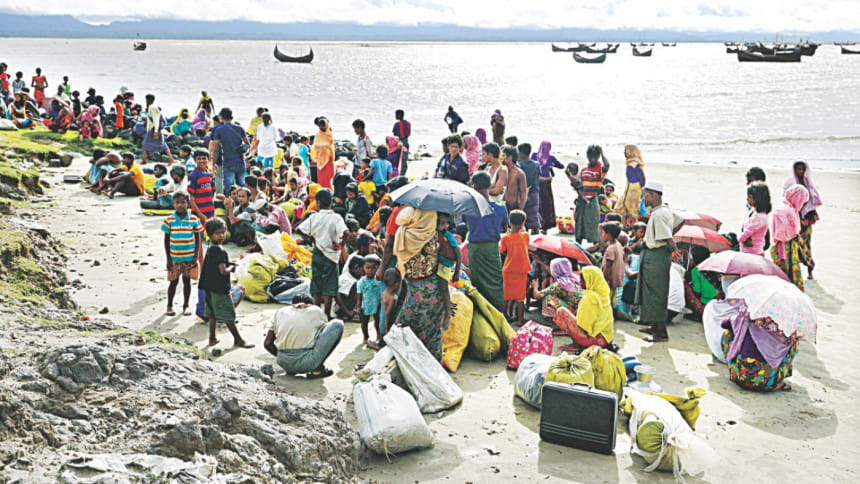
Despite Myanmar's assurances that it is stopping the exodus of Rohingyas, members of the minority group continue to stream towards Bangladesh fleeing violence in Rakhine State.
At least 300 of the forcibly displaced people entered Bangladesh through Shah Porir Dwip point yesterday. The newly arrived refugees alleged fresh torching of houses at Maungdaw in the conflict-torn region.
Australia's ABC News reports that video footage from inside Myanmar shows half-buried corpses, villages burning and desperate people fleeing through the mountains.
The videos appeared to contradict claims from the country's de facto leader Aung San Suu Kyi that security forces ended their operations on September 5.
As Bangladesh struggles to cope with the unprecedented influx, UN's Emergency Relief Coordinator Mark Lowcock stresses that the origins of the crisis are in Myanmar and that its solutions ultimately have to be in that country.
He told reporters in Geneva on Friday that the people who have arrived in Bangladesh from Myanmar in recent weeks need a greater level of help from the international community.
The humanitarian aid chief called the situation “one of the most heart-rending,” recalling his encounter with an 11-year-old boy who was cradling his critically ill baby sister during his visit earlier this week to the host communities, reports the UN News Centre.
“His mother, the boy and his four siblings had set off on a journey lasting, I think nine days, fleeing violence and the burning of their village. The mother died on the journey. This little boy is now in sole charge of his four siblings, including his two-and-a-half-year-old severely acutely malnourished sister.”
Earlier, the UN Committee on the Elimination of Discrimination against Women and the Committee on the Rights of the Child called on the Myanmar authorities to immediately stop violence in northern Rakhine State, and to promptly and effectively investigate and vigorously prosecute cases of violence against women and children.
“We are particularly worried about the fate of Rohingya women and children subject to serious violations of their human rights, including killings, rape and forced displacement,” the experts said in a joint statement issued on Wednesday.
“Such violations may amount to crimes against humanity and we are deeply concerned at the State's failure to put an end to these shocking human rights violations being committed at the behest of the military and other security forces, and of which women and children continue to bear the brunt.”
The committees urge the civil and military authorities of Myanmar to fully comply with their obligations under both the Convention on the Rights of the Child and the Convention on the Elimination of All Forms of Discrimination against Women.
UN's migration agency IOM this week issued an appeal for $120 million through March to provide desperately needed aid to the refugees who have flooded into Cox's Bazar.
The appeal is part of a broader humanitarian response plan seeking $434 million to help 1.2 million people, including the host community.
An estimated 2,000 Rohingya refugees a day are still arriving in Cox's Bazar, according to IOM staff monitoring the Bangladesh-Myanmar border.
Observers believe that as many as 1,00,000 more people may be waiting to cross into Cox's Bazar from Rakhine's Buthidaung.
“Our humanitarian colleagues now tell us the number of Rohingya refugees who have fled Myanmar for Bangladesh since August 25 stands at 5,15,000 people,” said Stéphane Dujarric, spokesman for the UN secretary-general, during a briefing in New York.
Bangladesh was already hosting more than 3,00,000 refugees before this influx.
As the government plans a mega refugee camp for 8,00,000-plus refugees, UN Resident Coordinator in Dhaka Robert Watkins told AFP that the country should instead look for new sites to build more camps.
"When you concentrate too many people into a very small area, particularly the people who are very vulnerable to diseases, it is dangerous," Watkins said.
"There are stronger possibilities, if there are any infectious diseases that spread, that will spread very quickly," he said, also highlighting fire risks in the camps.
"It is much easier to manage people, manage the health situation and security situation if there are a number of different camps rather than one concentrated camp."
EU-INDIA STATEMENT
Also on Friday, India and the EU expressed deep concern at the recent spate of violence in Rakhine that has resulted in the outflow of a large number of people.
In a joint statement at the end of the 14th EU-India Summit, both the sides recognised the need for ending the violence without any delay.
They urged Myanmar to implement the Annan Commission's recommendations and work with Bangladesh to enable the return of the displaced persons from all communities to Rakhine.
India and the EU also recognised the role being played by Bangladesh in extending humanitarian assistance to the people in need.
In another development, India has identified 140 vulnerable locations, deployed more security personnel and surveillance gadgets, and launched a "campaign" against organised criminal gangs that help Rohingyas sneak.
BSF Director General KK Sharma said the paramilitary has deployed more security personnel and surveillance equipment to check the syndicates that help the Rohingyas to sneak into the Indo-Bangla border, the New Indian Express reported yesterday.
"The BGB has ensured that their [Rohingyas'] movement is being regulated and they have mounted some 'nakas' and check posts on various routes to ensure that they do not cross over to our side," he said.
ATTACKS ON
The ABC report says the bodies seen the videos were reportedly found in Gu Dar Pyin village, in Buthidaung township -- one of several sites where mass killings have allegedly occurred.
"The bodies still come out [of the mud] when the rains come," said Puttanee Kangkun, a human rights specialist with the group Fortify Rights, who viewed the footage in Bangkok.
The ABC received a batch of edited videos from a source whose material has been reliable in the past.
The Myanmar army has confirmed the death of at least 400 people it said were insurgents, but refugees have told stories of indiscriminate killings and gang rape, ABC wrote yesterday.
On September 19, Suu Kyi gave a state address, condemning any abuses in Rakhine. "Since September 5, there have been no armed clashes and there have been no clearance operations," she said.
But that is disputed by several sources.
"We have proof, evidence that the attacks [are] still going on after September 5 and people still move out from Rakhine," Puttanee Kangkun said.
Separate footage sent to the ABC allegedly shows security forces and vigilantes burning Muslim homes in the town of Maungdaw as recently as Thursday night.
Another video obtained by The Associated Press that villagers said was shot Thursday shows Rohingyas attempting to swim across the currents of a muddy river, from where it is a more than 20km walk through jungles to the border.
Many more people, from young children to old men, stand huddled with their belongings on the riverbank, writes the Toronto Star.
CANADA CONCERNED
“Canada is deeply concerned by the plight of the Rohingya and other ethnic minorities in Myanmar. The killings and other gross violations of human rights are part of a widespread attack against the Rohingya,” said two of its ministers in a joint statement yesterday.
“These are crimes against humanity -- and the responsibility for ending this ethnic cleansing falls squarely on Myanmar's military leadership and its civilian government.”
Chrystia Freeland, minister of foreign affairs, and Marie-Claude Bibeau, minister of international development, issued the statement on the situation in Myanmar, according to the website of Canadian government.
“Once again, we urge authorities to set the conditions for the safe and voluntary return of Rohingya refugees and other ethnic minorities to their rightful homes, in dignity, where they should live free from persecution and enjoy full equality under the law.”
Minister Freeland over the last month has spoken to her counterparts from numerous countries regarding the need to work together to exert pressure on the regime to end the violence in Rakhine.
A week ago, the minister also spoke with Myanmar's commander-in-chief, Min Aung Hlaing, to emphasise Canadians' concern for human rights violations against the Rohingya population.
ARSA OPEN TO PEACE
A Rohingya insurgent group said yesterday that they are ready to respond to any peace move by the government but a one-month ceasefire they declared to enable the delivery of aid in Rakhine is about to end.
The Arakan Rohingya Salvation Army (Arsa) did not say what action it would take after the ceasefire ends at midnight on Monday but it was "determined to stop the tyranny and oppression" waged against the Rohingya people.
"If at any stage, the Burmese government is inclined to peace, then Arsa will welcome that inclination and reciprocate," the group said in a statement.
Government spokesmen were not available for comment, writes Reuters.
When the Arsa announced its one-month ceasefire from September 10, a government spokesman said: "We have no policy to negotiate with terrorists."
The rebels launched coordinated attacks on about 30 security posts and an army camp on August 25. In response, the military unleashed a sweeping offensive across the north of Rakhine, driving Rohingya villagers into Bangladesh.

 For all latest news, follow The Daily Star's Google News channel.
For all latest news, follow The Daily Star's Google News channel. 

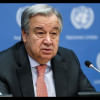
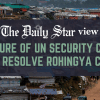
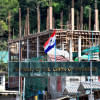

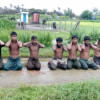


Comments